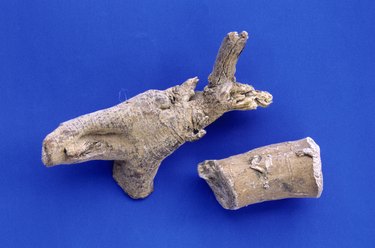
You'll see Ashwagandha in muscle-building formulas, though the herb's main use is as an adaptogen, similar to ginseng. Adaptogens are purported to help your body deal with stress, whether it be physical or mental. Though it has been used for thousands of years in Indian medicine, a strong body of scientific evidence does not exist to back any use for ashwagandha. Always consult a health-care provider before trying a new supplement.
HIV Muscle Wasting
Video of the Day
If you subscribe to Ayurvedic medicine and are an HIV-positive person, your practitioner may prescribe Ashwagandha to stimulate your immune system. The herb also is believed to help treat the muscle wasting associated with HIV, which in theory would help to slow, prevent or reverse weight loss. However, no scientific studies back either HIV-specific use, according to "How to Boost Your Immune System Naturally," by Gary Singh. Ashwagandha may be helpful in reducing side effects such as weight loss associated with chemotherapy drugs without interfering with the drugs' action, according to a 2006 study published in "Alternative Medicine Review."
Video of the Day
Muscle Building and Endurance
Ayurvedic doctors also recommend ashwagandha to treat weight loss that is associated with low levels of testosterone in men. However, ashwagandha has not been put to the test in clinical trials as a muscle-building aid, Singh notes. A 1994 "Journal of Ethnopharmacology" study on mice found the rodents subjected to a swimming regimen and given ashwagandha gained more muscle weight than rodents that did not receive the herb. Mice given ginseng also gained more muscle weight than rodents not given herbs, but ginseng was not as effective as ashwagandha for weight gain, notes lead study author A. Grandhi. Mice given both herbs had significant gains in endurance, as well.
Stress and Thyroid Hormones
Ashwagandha's purported ability to help your body resist stress may help to balance your cortisol levels and boost low thyroid function that is the result of chronic stress, according to ""Prescription for Drug Alternatives," by James Balch, et al. These purported effects, which Balch notes are backed by animal studies but not human trials, are likely to help stem weight gain rather than induce it.
Considerations
Ashwagandha can have gastrointestinal side effects that may interfere with weight gain, including vomiting and diarrhea. It also may irritate your gastrointestinal tract and worsen peptic ulcer disease. It also interacts with medicines and other herbs. Taking it with certain medications may reduce the drugs' immunosuppressive effects. These include azathioprine, dexamethasone, fluticasone, hydrocortisone, prednisone, tacrolimus and thramcinolone. Ashwagandha may increase both negative and positive effects of other drugs, including acetaminophen, butabarbital, fentanyl, hydrocodone, prazepam, sufentanil and zolpidem. It also enhances adverse and therapeutic effects of herbs and supplements that have sedative properties, such as kava kava, valerian, St. John's wort and 5-HTP.
- “The Chopra Center Herbal Handbook”; Deepak Chopra and David Simon; 2000
- “How to Boost Your Immune System Naturally”; Gary Singh; 2008
- “Alternative Medicine Review”; Ancient Medicine, Modern Use: Withania Somnifera and its Potential Role in Integrative Oncology”; M. Winters; 2006
- “Journal of Ethnopharmacology”; A Comparative Pharmacological Investigation of Ashwagandha and Ginseng”; A. Grandhi, et al.; 1994
- “The Hormone Diet”; Natasha Turner; 2010
- “Prescription for Drug Alternatives”; James Balch, et al.; 2008